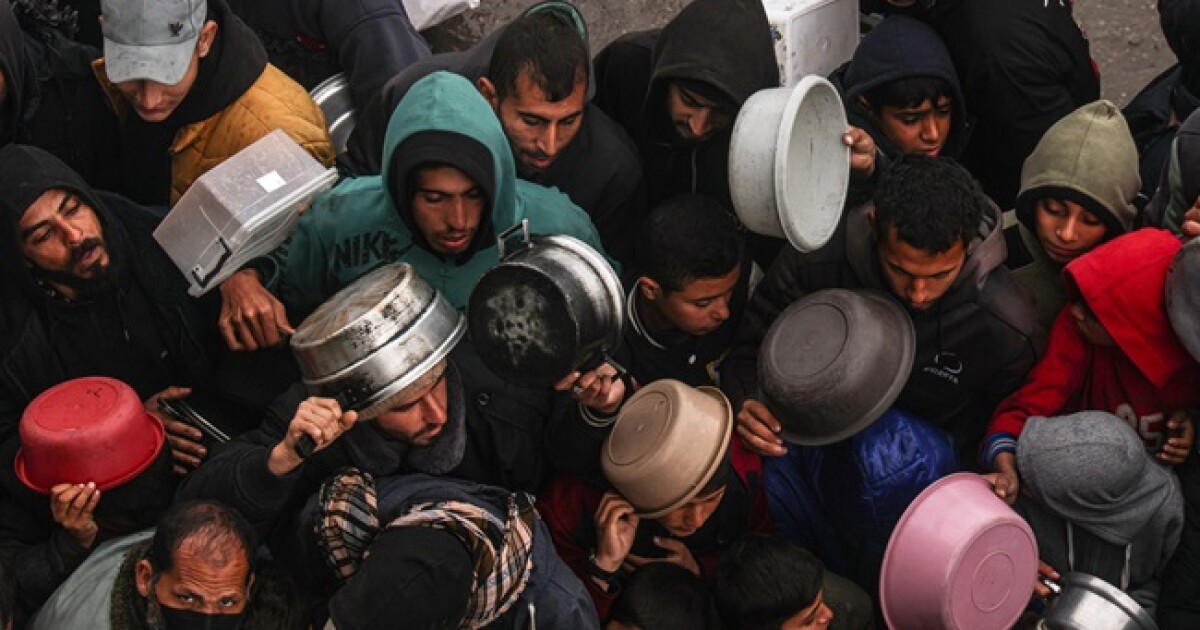
Abu Gibril killed his two horses without daring to tell his relatives and neighbors what he fed them. “I had no choice and I killed the horses to feed the children“This 60-year-old Palestinian farmer, who has taken refuge in the large displaced persons camp of Jabaliya, in the north of the Gaza Strip, told AFP.
The war took everything away. Since the fighting began in October 2023, the fighting has destroyed his home and his fields in Beit Hanun.in the far north of the Gaza Strip, and had to move to the Jabaliya camp, several kilometers away.
Jabaliya was, before the war, the largest displaced persons camp in the Gaza Strip, with more than 100,000 people crammed into 1.4 km2, according to the UN.
Since then, they have survived in a tent that Gibril set up next to a school formerly administered by the UN and where thousands of other displaced people settled.
They managed to save themselves in the fighting, but “now it is hunger that takes lives”said Gibril.
According to the UN, 2.2 million people, that is, the vast majority of the enclave’s population, are threatened with famine in this territory besieged by Israel.
Y This serious shortage could lead to an “explosion” of child mortality in Gaza, where one in six children under two years of age is severely malnourished.Unicef warned this week.
The situation is especially alarming in the north, where “chaos and violence” looms over the country, according to the World Food Program (WFP), which suspended aid distribution due to fighting and hungry crowds rushing on the trucks to loot them.
This Saturday, February 24, the Ministry of Health of Gaza, governed by the Islamist movement Hamas, announced that a 2-month-old baby, Mahmud Fatuh, had died of malnutrition in the Al Shifa hospital in Gaza City, less than 10 km from Jabaliya.
“Hunger eats us from within”
A video broadcast by media outlets close to Hamas, showing a dying baby presented as Mahmud Fatuh, is circulating on social networks, but at the moment it has not been possible to authenticate it.
According to what he said, Abu Gibril cooked the two horses, put rice in it, for lack of vegetables, and distributed it among his family and some neighbors.. Several dozen people were able to eat, but he did not tell them where the meat came from.
In general, in Gaza, no one consumes horse meat, a faithful companion of peasants. Thus, apart from two of his relatives, “no one knows that they actually ate horse,” he commented.
Since the Hamas attack on Israeli soil on October 7, which killed at least 1,160 people and sparked the conflict, 29,606 Palestinians have died in the Strip, the vast majority of them civilians, due to the offensive that Israel launched in retaliation. , according to the Gaza Ministry of Health.
In Jabaliya, hungry women and children lined up outside a food distribution point on Friday.
The rural inhabitants, meanwhile, are forced to comb the surroundings in search of anything edible, even barley, fodder, rotten corn or leaves.
There are times when they even beg. “We don’t have a single shekel at home. We go door to door, but no one gives us anything,” said one woman.
On Friday, dozens of people gathered in the Jabaliya camp to denounce their situation. Amer Abu Qamsan, one of its representatives, called on the international community to “save” the inhabitants of northern Gaza.
Around them, children held signs that read “The bombings didn’t kill us, but hunger takes over” or “Hunger eats us from within.”
Source: https://www.noticiascaracol.com/mundo/para-no-morir-de-hambre-en-gaza-mato-a-sus-dos-caballos-asi-alimento-a-familiares-y-vecinos-cb20


